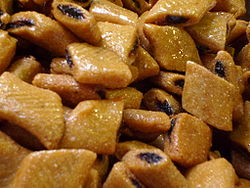Makroudh
 Makroudh covered in honey Makroudh covered in honey | |
| Type | Cookie |
|---|---|
| Place of origin | Maghreb |
| Main ingredients | Semolina, dates or figs |
Makroudh (Arabic: مقروض, romanized: maqrūḍ), also spelled Makrout, is a cookie from the cuisine of the Maghreb. It is filled with dates and nuts or almond paste, that has a diamond shape – the name derives from this characteristic shape.
The dough is made with a combination of semolina and flour, which gives the pastry a very specific texture and flavor. Makroudh can be fried in oil or oven-baked.
It is popular in the Maghreb where there are many varieties of Makroudh, some of which are pastries that do not share much in common with the traditional Makroudh except the shape. In Algeria, they may be filled with almond paste.
Makroudh with dates and honey is also popular during Eid al-Fitr.
Preparation
Makroudh is prepared by filling a dough made with semolina, usually using the Deglet Nour date variety. The dough is then rolled and cut into diamond-shaped pieces. The pastry is then either fried or oven-baked. The final step involves soaking the makroudh in a sweet syrup.
See also
References
- ^ Gaelle & Patrice Le Franc. "Makroudh". La Cuisinede Ma Copine. Archived from the original on 2012-07-08. Retrieved 2014-04-09.
- ^ "Makrout el louz - Les Joyaux de Sherazade". Les Joyaux de Sherazade (in French). 2015-07-16. Retrieved 2017-06-19.
- ^ "Recette pour ramadan facile / Makrout salé". Les Joyaux de Sherazade (in French). 2014-05-29. Retrieved 2017-06-19.
- ^ Marks, Gil (2010-11-17). Encyclopedia of Jewish Food. Houghton Mifflin Harcourt. ISBN 978-0544186316.
- ^ Jacob, Jeanne; Ashkenazi, Michael (2014). The World Cookbook: The Greatest Recipes from Around the Globe. ABC-CLIO.
- ^ "North African Cuisine". www.foodingredientsonline.com. Retrieved 2018-02-05.
| Levantine cuisine | |
|---|---|
| Beverages | Non-alcoholic beverages Arabic coffee Turkish coffee Arabic tea Jallab Mur Mate Dibs Sahlab Sharbat Qamar al-Din Tamarind Mint lemonade Fermented beverages Ayran Leben Distilled beverages Arak Beers Beer in Lebanon Beer in Syria Beer in Palestine Beer in Jordan Beer in Israel Wines Lebanese wine Syrian wine Palestinian wine Jordanian wine Israeli wine |
| Breads | |
| Appetizers and salads | |
| Dairy products | |
| Soups and stews | |
| Pastries | |
| Dishes |
|
| Grilled meats |
|
| Desserts |
|
| Unique instruments | |
| Related cuisines | |